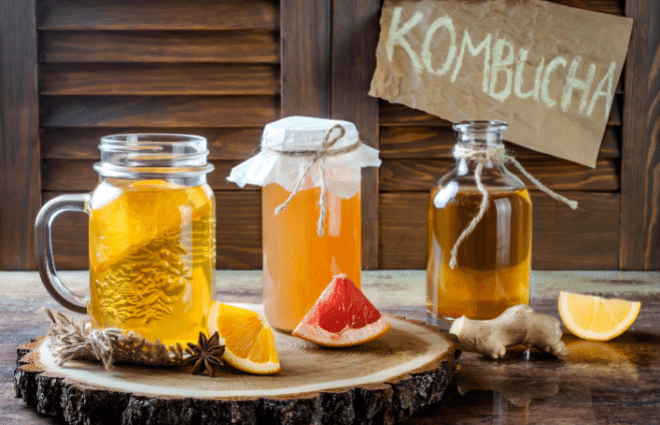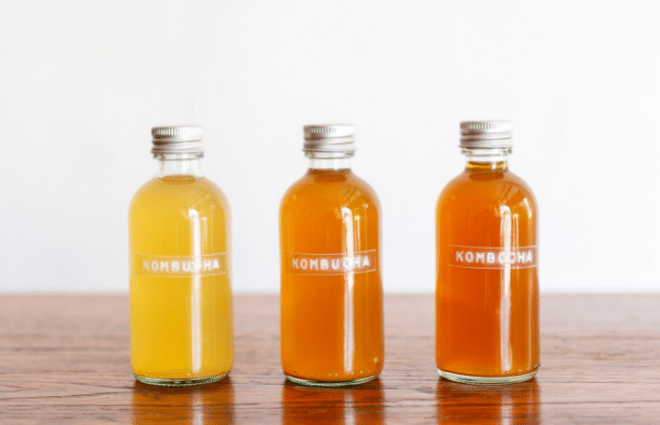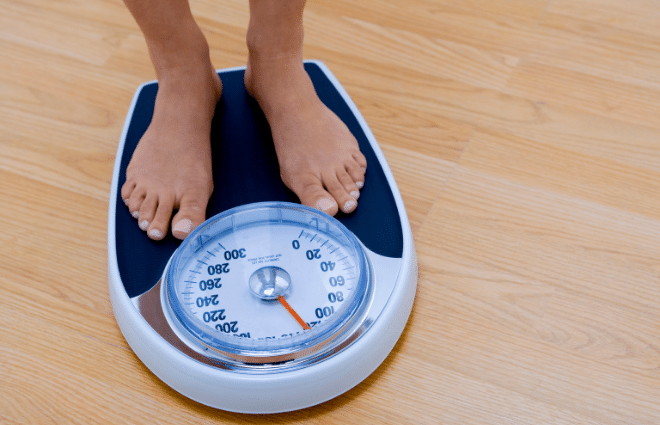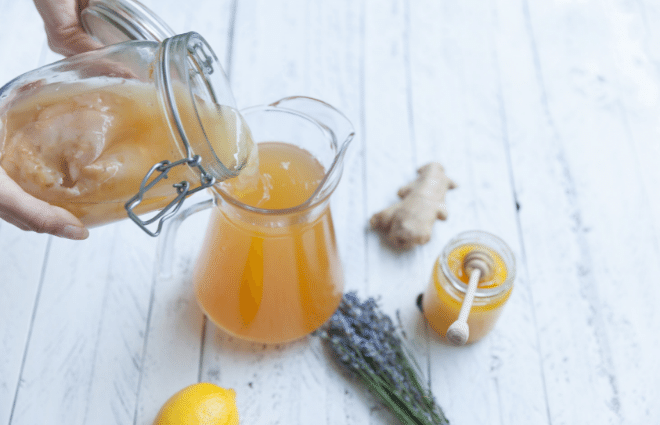What is Kombucha Tea? A Healthy Powerful Drink, But Not For Everyone
[This is a guest post from Shirley Geraghty, certified health coach and founder of ShirleyWellness.com. In this article, Shirley explains the pros (and a few cons) of drinking Kombucha. She lists the many health benefits of this popular health drink.]
I first discovered kombucha a few years ago, when it was offered to me as an alternative to alcohol.
I was in a wine shop and wanted a special bottle of good quality wine to celebrate a special occasion.
A few friends were not drinking alcohol, so when I asked for something that wasn’t alcoholic or very low alcohol, they offered kombucha.

I had never heard of kombucha, but bought a bottle based on the shopkeeper’s recommendation. It was in a wine bottle (which helped!) and I was told that it had a sour-sweet taste.
It turned out to be a huge success with my friends!
This post may contain affiliate links, which helps keep this content free. Please read our disclosure for more info.
What is Kombucha?
According to advocates, drinking kombucha can lead to improvements in the way your body functions.
They say it can help:
- your digestion
- rid your body of toxins
- boost your energy and immune system
- help you lose weight
- decrease high blood pressure and heart disease
However, no research in humans has taken place but these reasons alone, taking a closer look at kombucha is certainly worthwhile.
What is in Kombucha?
Kombucha is a fermented drink consisting of black tea (sometimes green tea), sugar, and contains a colony of bacteria, a type of yeast called ‘scoby’.
Once fermentation is complete, the drink becomes carbonated.

It also contains vinegar-type organic enzymes, probiotics, acids, and vitamins.
It’s been used for thousands of years and proclaimed to be a miracle health elixir, particularly by the Chinese.
A healthy powerful drink but it’s not for everyone.
Popularity of Kombucha is on the Rise
Kombucha has grown in popularity over recent years.
It’s fairly easy to make at home and the trends show that people are now looking for a drink that is more functional with nutritional benefits, rather than drinking sodas or high calorie juices.
The global kombucha market is expected to grow at an annual rate of 19.7% from 2020 to 2027 to reach USD 7.05 billion by 2027.
Is Kombucha Safe?
Generally kombucha is considered safe but according to the Mayo Clinic there have been reports of adverse effects, such as stomach upset, infections and allergic reactions in some kombucha tea drinkers.
It is, however, highly likely that this is because people are either drinking too much of it or are brewing at home with non-sterile equipment.
The FDA says kombucha is safe when it’s properly prepared, so I would suggest you buy it from a supermarket or a health store.
What Does Kombucha Taste Like?
With a sour, sharp, and vinegary-sweet taste, it is certainly an acquired taste for many.
When trying it for the first time, it’s possible you will either love it or hate it.
However there are lots of different flavours to make it more palatable and enjoyable, such as ginger lemon, cherry plum and peach.

Kombucha Nutrition Facts
A 16 ounce serving of unpasteurized organic kombucha may contain:
- 60 calories
- 20 mg of sodium
- 14 grams carbohydrate
- 4 grams of sugar
- 20 – 25% of your daily B and vitamins – B2, B1, B3, B6, foliate, and B12, known as the energy vitamin.
It contains black tea which is high in polyphenols and antioxidants, great for the body and energizes the system.
Kombucha Benefits for Women

If you already eat fermented foods like yogurt, kefir, fermented pickles, or sauerkraut then you can add Kombucha to this list, because the health benefits are similar.
1. It’s a Probiotic – It can help your digestion and help your immune system.
2. It Improves Energy – Its organic enzymes make iron available to the body and it contains vitamin C which helps with iron absorption too.
3. Better Digestion and Gut Health – The acid in kombucha triggers enzymes that help dissolve protein which leads to better digestion. The fermentation process creates probiotics. Probiotics help with diarrhea and irritable bowel syndrome (IBS).
When sugar is fermented, it creates lots of probiotics or different types of yeasts to form and it helps balance out and kill off the bad microorganisms in the body which aids in healthy bowel movements.
4. Helps Blood Sugars – Kombucha helps stabilize your blood sugars. It improves insulin resistance and so improves cholesterol and blood sugar. You’re likely to have less cravings, less hunger and you’re able to go longer when you’re fasting.
5. Helps with Type 2 Diabetes – If you’re drinking kombucha in place of soda or other sugary drinks, it’s much lower in sugar and an alternative to those with diabetes.
6. It Lowers Stress Levels – Kombucha contains a lot of B Vitamins which has been proven to lower stress.
7. Aids Sleep – If you don’t drink too much, it will help your sleep. So take about half a container full (about 8 oz.), and it’s great mixed with a drop of water to sip before bedtime.
You will sleep better because when you acidify the stomach, it increases the absorption of calcium and other minerals which will aid your sleep.
However, don’t take too much kombucha, otherwise it may have the opposite effect and you won’t be able to sleep at night.
8. Lowers Cholesterol Levels – The good news is that there was a decrease of cholesterol levels in an animal study but no human studies have yet been conducted.
How it Can Help Weight-Loss for Women

Detox – You can use kombucha as part of your detoxing routine as it rids your body of toxins because of the glucuronic acid, according to this review.
Low in Calories – As kombucha only contains around 30 calories per cup you can use it to replace the calorically dense fruit juices or sodas that you’re drinking.
Although it is advised to stick to the guidelines of 8 ounces per day, there isn’t research to back up any health claims, but the animal studies are indicating that it could encourage a calorie reduced diet.
Other Health Benefits of Kombucha
1. High in Antioxidants
The black tea that’s used to make kombucha is good for anti-aging and fights heart disease and cancer.
2. Supports Mental Health
Probiotics support the gut lining which in turn supports mental health, as do the B vitamins it contains.
3. Helps with Arthritis
Many believe it helps with joint pain and kombucha contains enzymes that assist in muscle tissue repair.
4. Lung Support
Kombucha can support your lungs in certain instances because of the probiotics in the black tea. The antioxidants support the cardiovascular system.
5. Antibacterial Properties
The organic acids in kombucha create an environment where good bacteria can grow and also it keeps bad bacteria and certain yeasts at bay.
6. Heart Health
It’s good for your heart because of the antioxidants.
7. Supports the Liver
Kombucha has organic acids which support the liver and aids in detoxification and cleansing.
Is Kombucha Healthy for Everyone?

If you have a condition called acidosis which means that your body has too much acid, you don’t want to drink kombucha tea because it will make the condition worse, especially in 52% of women according to this report.
If you have an ulcer or gastritis, then it’s not a good idea to drink kombucha because there can be too much acid.
It’s also not advised to drink kombucha if you have a condition called SIBO, small intestinal bacterial overgrowth.
Alcohol Content – Because it’s a fermented drink it does contain trace amounts of alcohol . It’s normally about 0.5% but it can be higher, so it is best to read the labels .
Hidden Sugar – There might be about 2g of sugar in the Kombucha so read the labels. The sugar content can be a lot higher, up to about 10g of sugar, depending on what ingredients were used.
It varies from supplier to supplier. Some manufacturers brew all the sugar out. This type of Kombucha has a ‘long aged’ fermentation process and is ideal if you are following a low-sugar eating plan.
But if you’re making it yourself, you can allow it to ferment longer so you will have less sugar.
When you are making Kombucha yourself, remember it involves letting bacteria grow in a liquid you’re going to drink.
Many of the bacteria are considered probiotics, but if it’s not prepared properly, it can grow harmful bacteria or mold.
Is Kombucha Bad for Your Health?
Is it right for everyone – No, unfortunately kombucha isn’t right for everyone and AVOID if you have:
- Candida Issues – If you have candida yeast overgrowth do not drink kombucha.
- Dental Concerns – Kombucha contains acid and can wear away the enamel, just like fruit acids, so best to use a straw if you have any concerns.
- Digestive Diseases – Those who suffer from IBS, Crohn’s disease, or ulcerative colitis may want to avoid kombucha. Many people with IBS can tolerate about 6 ounces.
- Those Avoiding Alcohol – The alcohol levels are very low, but they are still there.
- Those Avoiding Caffeine – Kombucha’s caffeine levels are similar to about 1/3 or 1/4 a cup of coffee, and similar caffeine levels to a cup of white tea or green tea.
Making Kombucha Yourself at Home: Just be rigorous with cleanliness, including your equipment and your hands. Use glass, stainless steel or plastic containers, but no ceramic.
How to Choose the Right Kombucha: Check the labels for sugar content and experiment with various flavors until you get one that you like the most.
What is the Best Way to Drink Kombucha, and How Much Should You Start With?
If you don’t fall under the Avoid List, I suggest you start drinking a small amount in moderation and then gradually work up to a full serving to gauge your body’s response.
It’s safely recommended you can consume up to four ounces/118 mL one to three times a day.
That means no more than 12 ounces a day. I like to drink one serving a day in the morning before breakfast, and you need to drink it daily to benefit.
Make or Buy Your Own?

You can buy it or make your own at home.
Kombucha is widely available in two forms, namely, original raw flavor and flavor-infused form.
I have tried both and prefer the flavor-infused form, but watch out for the increase in sugar!
Is Kombucha an Alternative to Alcohol or Sodas?
This is how I first discovered Kombucha and I think it’s a great alternative for alcohol.
It has the same texture as beer or champagne with similar carbonation.
Can I Include Kombucha on a Keto Diet?
Kombucha is good for people following the keto plan because it contains minimal alcohol and should not kick you out of ketosis.
But check the ingredients and nutrition label to make sure it’s also low in sugar.
Experiment Yourself!
I believe that healthy people should drink kombucha and it is a great addition to a healthy diet plan.
If you want to lose weight, increase energy levels or just get rid of the sodas, then kombucha is a great alternative.
Kombucha is a super food to help you do just that, but as I said before it is an acquired taste.
So experiment with the different flavors and buy from a variety of manufacturers until you get one you like.
With the wide assortment of flavors available and all tastes quite unique, it’s well worth taking the time to experiment, enjoy!
About the Author

Hi I’m Shirley Geraghty, I’m a certified Health Coach and founder of ShirleyWellness.com. I specialise in helping women lose weight and beat Emotional Eating for good, but it hasn’t always been this way.
I’ve struggled ever since I can remember to be happy with my body, jumping on to the next new diet, then off again, thinking ‘this one will work’. After the initial success had worn off, I was back to the same place – out of control with food and regaining all the weight lost.
Now well over a decade later and having helped many hundreds of women lose weight through a whole range of emotional eating strategies, I can help you too. If this is something you struggle with, check out my private Facebook Group, where we can connect and you get support from myself and the community.
